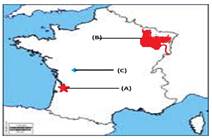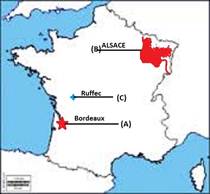The French Revolution - Test Papers
CBSE TEST PAPER-01
Class – IX Social Science (French Revolution)
General Instruction:
- All questions are compulsory.
- Question No. 1 to 4 carries one mark each.
- Question No. 5 and 10 carry three marks each.
- Question No. 11 and 12 carry five marks each.
- Name the book that has proposed a division of power within the government?
- What was Livre?
- Define Tithe?
- Who was the king of France at the time of French revolution?
- The eighteenth century France witnessed the emergence of the middle class’. Who were they and what were their ideas?
- Describe any three causes for the fall of the Jacobin government in France.
- What do you understand by the term “Reign of Terror’?
- Highlight the provisions of the constitution which was introduced after the fall of Jacobin club.
- What role did women play during the revolutionary years?
- Three items A, B, and C are shown in the given outline map of France. Identify these items with the help of the following information and write their correct names on the lines marked on the map.
- Port-related to slave trade
- Region not affected by the great fear
- Epicenters of main panic movement

- Describe the main features of the constitution of 1791. Mention any five points.
- Write a short note on the Reign of Terror in France. Describe any five steps taken by him to consolidate his power in France.
CBSE TEST PAPER-01
Class – IX Social Science (French Revolution)
[ANSWERS]
- The Spirit of the Laws
- It was a unit of currency in France discontinued in 1794.
- A tax levied by the church, comprising one-tenth of the agricultural produce.
- King Louise XVI of the Bourbon family.
- The eighteenth century witnessed the emergence of social groups, termed as the middle class. In addition to merchants and manufacturers, the middle class included professions such as lawyers or administrative officials.
- They earned their wealth through an expanding overseas trade and manufacture of goods such as woolen silk textiles that were exported or bought by the richer members of society.
- All of these were educated and believed that no group in society should be privileged by birth. Rather, a person's social position must depend on his merit.
- They wanted to build a society based on freedom and equal laws.
- They demanded the voting in the General Assembly should be conducted under the principle of one person one vote.
- The representatives of the third estate viewed themselves as spokesmen for the whole French nation.
- The Jacobin government followed the policy of severe control and punishment.
- All those who were regarded as the enemy of the republic were arrested and tried by the tribunal. If found guilty they were guillotined.
- Meat and bread were rationed.
- Peasants were forced to transport their grain to the cities and sell it at fixed prices.
- Even Luis XVI was sentenced to death by a court on charge of treason.
- Finally, opposition to such severe control began to grow and was responsible for the fall of the Jacobin government.
- The period from 1793 to 1794 is referred to a reign of terror.
- Robespierre followed the policy of severe control and punishment.
- All those who were regarded as the enemy of the republic were arrested and tried by the tribunal. If found guilty they were guillotined
- The fall of the Jacobin Government allowed the wealthier people to seize power.
- A New constitution was introduced which denied the vote to non-propertied sections of society.
- The new constitution adopted a directory system.
- It provided for two elected legislative councils. These then appointed a Directory, an executive made up of five members.
- This was meant as a safeguard against the concentration of power in a one-man executive as under the Jacobins.
- During the revolutionary years women were active participants:
- In order to discuss and voice their interests, they started their own political clubs and newspapers.
- About 60 women's clubs emerged in different French cities, the most famous being the Society of Revolutionary and Republic Women.
- They wanted to enjoy some political rights as men i.e., right to vote, to be elected to the Assembly and to hold political office.
- Women's struggle for equal political rights during the revolutionary years inspired French women during the late 19th and 20th centuries. Finally, in 1946, French women won the right to vote.

- The new constitution made France a constitutional Monarchy.
- National Assembly: It had 745 members and was indirectly elected and could legislate.
- Right to Vote: Only men above the age of 25 who paid taxes has equal to 3 days of a labourer’s wage were active citizens and can vote.
- Powers of National Assembly: Powers have distributed among different institutions − the legislature, the executive, and the judiciary.
- The Declaration of Rights: The Constitution began with this declaration and included rights like rights to life, freedom of speech and freedom of opinion.
- It abolished the nobility, declaring all men equal before the law;
- The existing geographical divisions of France were abolished, and a new system of Departments subject to central control was substituted.
- The main feature of the constitution was to limit the power of the king.
- Power to make laws was vested in the National Assembly.
- Indirect elections were introduced to elect members of the National Assembly.
- Reign of Terror refers to the period 1793-94 when France became a republic under Maximilian Robespierre and followed a policy of severe control and punishment. Resistance could be declared as treason and punished by guillotine. In this 14-month period, about 17000 people including innocents were executed.
Terror was not an instrument of class war. It was directed not only against the privileged classes or the rich middle class but even more against the innocent. The enemies of the nation were viewed as enemies of the republic.
An atmosphere of restlessness, insecurity, and anxiety prevailed. Robespierre was a virtual dictator of France. He followed his policies so adamantly that his supporters, in the end, left him. He was finally convicted and guillotined.
Steps were taken by him to consolidate power in France:-- Robespierre followed a policy of severe control and punishment.
- Maximum ceiling on wages and prices.
- Rationing of Meat and bread.
- Peasants were made their grain to the cities and sell it at a fixed price.
- Use of more expensive white flour was forbidden.
- All were to eat the equality bread a loaf made of whole wheat.
- Equality in forms of speech and address. Instead of the traditional Monsieur and Madame, all French men and women were henceforth citoyen and citoyenne.
- Churches were shut down & their buildings were converted into barracks & offices.
